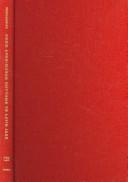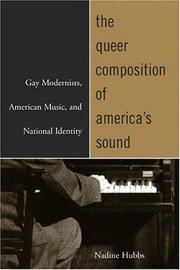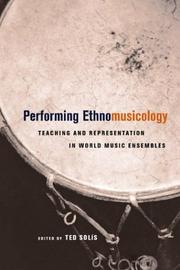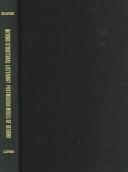| Listing 1 - 8 of 8 |
Sort by
|
Book
ISBN: 0820360821 Year: 2021 Publisher: Athens : Mary Francis Early College of Education and the University of Georgia Libraries,
Abstract | Keywords | Export | Availability | Bookmark
 Loading...
Loading...Choose an application
- Reference Manager
- EndNote
- RefWorks (Direct export to RefWorks)
Professeurs de musique --- Étudiants en musique --- Music teachers --- Music students --- African American students --- Early, Mary Frances. --- University of Georgia. --- University of Georgia --- Students. --- 1900-1999 --- United States. --- États-Unis --- United States --- Relations raciales --- Histoire --- Race relations --- History
Book
ISBN: 178204700X 1783270977 Year: 2016 Publisher: Suffolk : Boydell & Brewer,
Abstract | Keywords | Export | Availability | Bookmark
 Loading...
Loading...Choose an application
- Reference Manager
- EndNote
- RefWorks (Direct export to RefWorks)
Opera has become big business as well as an art form, attracting young and old, true connoisseurs, enthusiasts and celebrities. And while opera singers and superstars sometimes attract a separate following, the stage director's job is often the one that really counts, yet it is a type of specialised knowledge available only to a select few. Here, Michael Hampe brings glimpses of the director's work to a wider audience. The Crafty Art of Opera uncovers the many techniques and rules that should inform an opera's staging: the need for singers to know their orchestra, the importance of space around singers, the gestures of languages, what we all can learn from Mozart, and the primacy of sense over effect, to name but a few. It shows how stories, through music, become tangible and real. Packed with many anecdotes from the author's luminous career, this book is dedicated to opera-lovers who want to understand 'how it is done'; to opera-makers who want to better understand their craft;and, above all, to those who loathe opera, in order to prove them wrong. Eminently readable, it brings both insight and wit from a life spent in opera as director and teacher.
MICHAEL HAMPE is an internationally acclaimed opera stage director. The Crafty Art of Opera was published in German as Opernschule.
Opera. --- Opera --- Opera direction --- Opera production --- Operas --- Comic opera --- Lyric drama --- Opera, Comic --- Drama --- Dramatic music --- Singspiel --- Production and direction. --- Direction --- Production and direction --- History and criticism --- classical music. --- history of theatre. --- how to understand opera. --- music students. --- music theory. --- musicology. --- opera directors. --- opera studies. --- study of opera. --- vocal performance.

ISBN: 0520939441 9786612358357 1282358359 142377115X 9780520939448 9781423771159 9780520247079 0520247078 9780520247086 0520247086 0520247078 9780520247079 0520247086 9780520247086 9781282358355 Year: 2006 Publisher: Berkeley : Chicago : University of California Press ; Center for Black Music Research, Columbia College,
Abstract | Keywords | Export | Availability | Bookmark
 Loading...
Loading...Choose an application
- Reference Manager
- EndNote
- RefWorks (Direct export to RefWorks)
This book explores the complexity of Cuban dance music and the webs that connect it, musically and historically, to other Caribbean music, to salsa, and to Latin Jazz. Establishing a scholarly foundation for the study of this music, Raul A. Fernandez introduces a set of terms, definitions, and empirical information that allow for a broader, more informed discussion. He presents fascinating musical biographies of prominent performers Cachao López, Mongo Santamaría, Armando Peraza, Patato Valdés, Francisco Aguabella, Cándido Camero, Chocolate Armenteros, and Celia Cruz. Based on interviews that the author conducted over a nine-year period, these profiles provide in-depth assessments of the musicians' substantial contributions to both Afro-Cuban music and Latin Jazz. In addition, Fernandez examines the links between Cuban music and other Caribbean musics; analyzes the musical and poetic foundations of the Cuban son form; addresses the salsa phenomenon; and develops the aesthetic construct of sabor, central to Cuban music. Copub: Center for Black Music Research
Latin jazz --- Blacks --- Afro-Cuban jazz --- Jazz --- Negroes --- Ethnology --- History and criticism. --- Music --- Black persons --- Black people --- Blacks -- Cuba -- Music -- History and criticism.. --- Latin jazz -- History and criticism. --- aesthetics. --- african diaspora. --- afro cuban music. --- black music. --- caribbean music. --- cuba. --- cuban dance music. --- cultural history. --- ethnomusicologists. --- ethnomusicology. --- famous musicians. --- historical perspective. --- interviews. --- latin jazz. --- latin music. --- music analysis. --- music and culture. --- music historians. --- music history. --- music students. --- music terminology. --- musical biographies. --- musical foundations. --- musicology. --- nonfiction. --- rhythms. --- salsa music. --- song forms.

ISBN: 0520937953 1282763067 1597348422 9786612763069 9780520937956 1417545224 9781417545223 9781597348423 9781282763067 0520241843 9780520241848 0520241851 9780520241855 661276306X Year: 2004 Publisher: Berkeley : University of California Press,
Abstract | Keywords | Export | Availability | Bookmark
 Loading...
Loading...Choose an application
- Reference Manager
- EndNote
- RefWorks (Direct export to RefWorks)
In this vibrant and pioneering book, Nadine Hubbs shows how a gifted group of Manhattan-based gay composers were pivotal in creating a distinctive "American sound" and in the process served as architects of modern American identity. Focusing on a talented circle that included Aaron Copland, Virgil Thomson, Leonard Bernstein, Marc Blitzstein, Paul Bowles, David Diamond, and Ned Rorem, The Queer Composition of America's Sound homes in on the role of these artists' self-identification-especially with tonal music, French culture, and homosexuality-in the creation of a musical idiom that even today signifies "America" in commercials, movies, radio and television, and the concert hall.
Gay composers --- National music --- Modernism (Music) --- Music --- Composers --- Patriotic music --- Modernism in music --- Modernist music --- Musical modernism --- Style, Musical --- History and criticism. --- United States --- 20th century --- History and criticism --- america. --- american culture. --- american identity. --- american music. --- american sound. --- art and music. --- biographical. --- composers. --- famous musicians. --- french culture. --- gay composers. --- gay modernists. --- gender identity. --- gender studies. --- history of homosexuality. --- homosexuality. --- lgbtq. --- manhattan. --- modern america. --- music and culture. --- music historians. --- music history. --- music students. --- music studies. --- musicology. --- national identity. --- nonfiction. --- queer studies. --- self identification. --- tonal music.

ISBN: 9786612762932 0520937171 1597348031 1282762931 9780520937178 0520238745 9780520238749 0520238311 9780520238312 9781597348034 9781282762930 Year: 2004 Publisher: Berkeley : University of California Press,
Abstract | Keywords | Export | Availability | Bookmark
 Loading...
Loading...Choose an application
- Reference Manager
- EndNote
- RefWorks (Direct export to RefWorks)
Performing Ethnomusicology is the first book to deal exclusively with creating, teaching, and contextualizing academic world music performing ensembles. Considering the formidable theoretical, ethical, and practical issues that confront ethnomusicologists who direct such ensembles, the sixteen essays in this volume discuss problems of public performance and the pragmatics of pedagogy and learning processes. Their perspectives, drawing upon expertise in Caribbean steelband, Indian, Balinese, Javanese, Philippine, Mexican, Central and West African, Japanese, Chinese, Middle Eastern, and Jewish klezmer ensembles, provide a uniquely informed and many-faceted view of this complicated and rapidly changing landscape. The authors examine the creative and pedagogical negotiations involved in intergenerational and intercultural transmission and explore topics such as reflexivity, representation, hegemony, and aesthetically determined interaction. Performing Ethnomusicology affords sophisticated insights into the structuring of ethnomusicologists' careers and methodologies. This book offers an unprecedented rich history and contemporary examination of academic world music performance in the West, especially in the United States. "Performing Ethnomusicology is an important book not only within the field of ethnomusicology itself, but for scholars in all disciplines engaged in aspects of performance-historical musicology, anthropology, folklore, and cultural studies. The individual articles offer a provocative and disparate array of threads and themes, which Solís skillfully weaves together in his introductory essay. A book of great importance and long overdue."-R. Anderson Sutton, author of Calling Back the Spirit Contributors: Gage Averill, Kelly Gross, David Harnish, Mantle Hood, David W. Hughes, Michelle Kisliuk, David Locke, Scott Marcus, Hankus Netsky, Ali Jihad Racy, Anne K. Rasmussen, Ted Solís, Hardja Susilo, Sumarsam, Ricardo D. Trimillos, Roger Vetter, J. Lawrence Witzleben
Folk music groups. --- World music --- Ethnomusicology. --- Musical groups --- Music --- Comparative musicology --- Ethnology --- Musicology --- Instruction and study. --- 78.50 --- Ethnomusicology --- Folk music groups --- Instruction and study --- Ethnomusicologie --- Musiques du monde --- Groupes folkloriques --- Global music --- academic world music ensembles. --- anthology. --- anthropology. --- creating ensembles. --- cultural studies. --- essay collection. --- ethical issues. --- ethnomusicologists. --- ethnomusicology. --- folklore. --- historical musicology. --- intercultural music transmission. --- intergenerational. --- music pedagogy. --- music performance. --- music scholars. --- music students. --- music teaching. --- musicians. --- performing arts. --- practical issues. --- public music performance. --- representation. --- teaching ensembles. --- theoretical issues. --- western music performers. --- world music ensembles.

ISBN: 0520937023 1597344915 9780520937024 0520237579 9780520237575 0520237609 9780520237605 1417545070 9781417545070 9781597344913 Year: 2004 Publisher: Berkeley : University of California Press,
Abstract | Keywords | Export | Availability | Bookmark
 Loading...
Loading...Choose an application
- Reference Manager
- EndNote
- RefWorks (Direct export to RefWorks)
In a highly influential essay, Rose Rosengard Subotnik critiques "structural listening" as an attempt to situate musical meaning solely within the unfolding of the musical structure itself. The authors of this volume, prominent young music historians and theorists writing on repertories ranging from Beethoven to MTV, take up Subotnik's challenge in what is likely to be one of musical scholarship's intellectual touchstones for many years to come. Original, innovative, and sophisticated, their essays explore not only the implications of the "structural listening" model but also the alternative listening strategies that have developed in specific communities, often in response to twentieth-century Western music.
Musical criticism. --- Musical analysis. --- Music --- Postmodernism. --- Post-modernism --- Postmodernism (Philosophy) --- Arts, Modern --- Avant-garde (Aesthetics) --- Modernism (Art) --- Philosophy, Modern --- Post-postmodernism --- Music and society --- Hermeneutics (Music) --- Musical aesthetics --- Aesthetics --- Music theory --- Analysis, Musical --- Analytical guides (Music) --- Music analysis --- Music appreciation --- Music criticism --- Journalism --- Philosophy and aesthetics. --- Social aspects. --- Philosophy --- Analysis, appreciation --- Analytical guides --- Instruction and study --- History and criticism --- 20th century. --- anthology. --- beauty. --- beethoven. --- collection of essays. --- listening strategies. --- listening. --- modes of listening. --- mtv. --- music historians. --- music scholars. --- music students. --- music textbooks. --- music theorists. --- music theory. --- musical communities. --- musical meaning. --- musical scholarship. --- musical structure. --- nonfiction essays. --- nonfiction. --- postmodern modes of hearing. --- postmodern theory. --- structural hearing. --- theoretical perspective. --- western music.
Book
ISBN: 0520958810 9780520958814 0520281535 9780520281530 9780520281530 Year: 2014 Publisher: Berkeley, CA : University of California Press,
Abstract | Keywords | Export | Availability | Bookmark
 Loading...
Loading...Choose an application
- Reference Manager
- EndNote
- RefWorks (Direct export to RefWorks)
Where do you place the hyphen in "Beethoven" if it breaks between two lines? How do you cite John Coltrane's album A Love Supreme? Is it "premiere" or "première"? The answers and much more can be found in this definitive resource for authors, students, editors, concert producers-anyone who deals with music in print. Extending the principles devised for the classical repertoires, this revised and expanded edition now includes examples from world music, rock, jazz, popular music, and cinema. This essential volume covers some of the thorniest issues of musical discourse: how to go about describing musical works and procedures in prose, the rules for citations in notes and bibliography, and proper preparation of such materials as musical examples, tables, and illustrations. One section discusses program notes, while others explain the requirements for submitting manuscripts and electronic files, and outline best practices for student writers. An appendix lists common problem words. Updates include greatly simplified citations of Internet locators, the recognition of multiple platforms, and the expectation of paperless transmission and storage of work. Cited as the authority by The Chicago Manual of Style, this classic handbook is the go-to source for anyone writing about music.
Musical criticism --- Music --- Art music --- Art music, Western --- Classical music --- Musical compositions --- Musical works --- Serious music --- Western art music --- Western music (Western countries) --- Hermeneutics (Music) --- Music criticism --- Journalism --- Authorship --- Historiography --- History and criticism --- authors. --- bibliography. --- chicago manual of style. --- cinema. --- citation rules. --- concert producers. --- editors. --- jazz. --- music criticism. --- music critics. --- music historians. --- music history. --- music in print. --- music scholars. --- music students. --- music studies. --- music writers. --- music writing. --- musical discourse. --- musicians. --- musicology. --- nonfiction guide. --- popular music. --- program notes. --- prose writing. --- reference guide. --- rock music. --- student writers. --- style guide. --- textbooks. --- world music. --- writing resource.
Book
ISBN: 0520961005 9780520961005 9780520285583 Year: 2018 Publisher: Berkeley, CA : University of California Press,
Abstract | Keywords | Export | Availability | Bookmark
 Loading...
Loading...Choose an application
- Reference Manager
- EndNote
- RefWorks (Direct export to RefWorks)
Experiencing Latin American Music draws on human experience as a point of departure for musical understanding. Students explore broad topics-identity, the body, religion, and more-and relate these to Latin American musics while refining their understanding of musical concepts and cultural-historical contexts. With its brisk and engaging writing, this volume covers nearly fifty genres and provides both students and instructors with online access to audio tracks and listening guides. A detailed instructor's packet contains sample quizzes, clicker questions, and creative, classroom-tested assignments designed to encourage critical thinking and spark the imagination. Remarkably flexible, this innovative textbook empowers students from a variety of disciplines to study a subject that is increasingly relevant in today's diverse society. In addition to the instructor's packet, online resources for students include:customized Spotify playlistonline listening guidesaudio sound links to reinforce musical conceptsstimulating activities for individual and group work
Music --- Art music --- Art music, Western --- Classical music --- Musical compositions --- Musical works --- Serious music --- Western art music --- Western music (Western countries) --- History and criticism. --- Analysis, appreciation. --- Social aspects --- audio tracks. --- candombe. --- ethnic music. --- jewish music in latin america. --- latin american music listening guide. --- latin american music. --- latin american religious music. --- marimba. --- music and healing. --- music appreciation. --- music history. --- music in latin american culture. --- music instructor. --- music of santeria. --- music students. --- music studies. --- music teacher. --- music. --- musica vallenata. --- musical concepts. --- musical genres. --- organology. --- performing arts. --- samba. --- selk nam shamans. --- timbre. --- traditional latin american music.
| Listing 1 - 8 of 8 |
Sort by
|

 Search
Search Feedback
Feedback About UniCat
About UniCat  Help
Help News
News